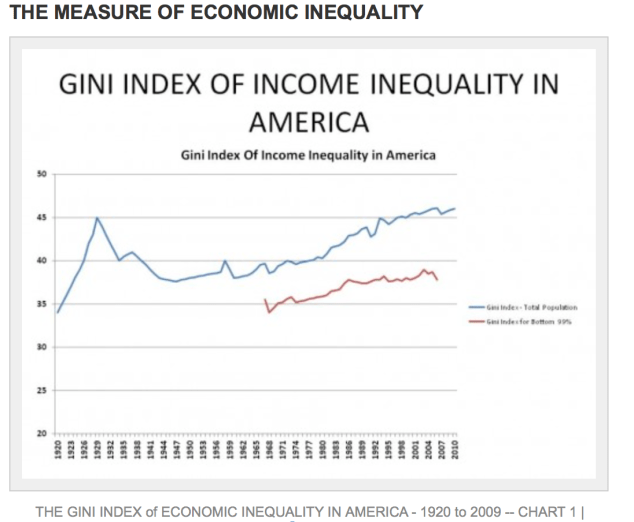October 26, 2016
This new term–“populism”–is in the news every day now, here in the US, and also all over Europe and elsewhere. What is it? In the November/December issue of Foreign Affairs, Fareed Zakaria suggests it can best be understood as,”…suspicion and hostility towards elites, mainstream politics, and established institutions.” As Zakaria explains, populists can be liberals or conservatives–both can feel disenfranchised. A number of the supporters of both Bernie Sanders and also those of Donald Trump can be seen as populists. Both camps feel they have lost out–in jobs, wages, and protections.
When I was studying in London in 2012, my favorite professor and I had a conversation about the growing inequality in China (his expertise) and around the developed world, including the UK and the US. Neither of us could see anything politically feasible that offers a potential reversal of the trend in steadily rising inequality. He observed that the only solution would likely be revolution. That’s because no matter how good the arguments, the wealthy (who have the political power) simply will not agree to any meaningful form of redistribution.
Unfortunately, it isn’t only the resistance of the wealthy. Technology and globalization are also exacerbating inequality, reducing job opportunities for the under educated, lowering wages. And, there is another thing–the countries most experiencing populism advancing are also experiencing slow growth. Countries which are not experiencing slow growth generally are not seeing populist movements within.
In my opinion, this is evidence of the power of inequality. Economists agree that inequality is likely to rise in periods of slow growth. Thomas Piketty wrote an 800 page best seller to explain this subject in 2013 (Capital in the Twenty-First Century). He forecasts a long period of slow global growth ahead, and explains why this will inevitably advance inequality. In other words, growth is necessary for reducing inequality.
The West is headed for a long period of slow growth ahead. The political candidates can promise more growth, but as Piketty explains in detail, it’s simply not gonna happen. Maybe for the US 2%, best case 3%, but we’re not going to see 4%, no matter who’s elected, no matter if Congress was completely aligned to do the right things (which they’re not). No matter the size of the Trump tax cuts, economists do not see growth stimulated. Tax cuts reduce government services which hurt workers more than the wealthy. This is a form of reverse redistribution–gains for the wealthy, net losses for the working class.
And, economists agree that while growth is necessary to reduce inequality, they agree it is not sufficient. That is, even if we had 4-5% annual GDP growth in the US, that alone would not reverse the advance of inequality. As Piketty explains, we would need redistribution. “Redistribution,” a word we haven’t seen in the political news. Not even Bernie Sanders has chosen to use this word. Redistribution is often misinterpreted as simplistically limited to “taking from the rich and giving to the poor,” or, as some Conservatives would say, “taking from those who worked hard and earned it and giving to those who want to live off the government.”
Of course, redistribution can take many forms, too many to try to list here. But consider that one might be to take from our military budget to increase our education budget. This way, there would be less wealth accumulation among the owners of the military industrial complex, but better opportunity for the underprivileged who currently cannot afford education, plus also better qualified workers for business, which helps the capital owners of the those businesses. This would be “redistribution.” Same kind of argument for infrastructure–improving it helps both the wealthy and the working class–they can get to work easier, afford housing a little farther out, and employers get access to more employees and better transportation for goods and services.
But, alas, there seems to be no appetite for considering even the most benign forms of redistribution. I belong to a group called “Patriotic Millionaires,” which argues that many of us recognize the dire problem ahead if we don’t regain some of our lost equality, and we’re willing to see our taxes increase if we see it going to advancing opportunity for the underprivileged. We feel our government has benefitted us and we are willing to contribute to redistribution. We don’t blame immigrants or China and Mexico for our problems.
Donald Trump is the leader of a populist party whose members are mostly on the Right side of our political divide. He’s trying to blame the lack of jobs and wages on immigrants, and appeal to nationalistic themes, especially targeting foreign countries for destroying our “greatness,” and promising a more powerful and decisive military which will annihilate any foreign threat. This is not the solution to the economic woes of his supporters, but they are so fed up with what “Washington” has (not) done for them, that they are ready to believe this demagogue.
Regrettably, in my opinion, it is just the politics and economics of the right that have controlled “Washington” for the last several decades and that’s why we are in the condition we are in. So in a way, the Trump Populist supporters are simply voting for return of what we have been experiencing. They need to “pay no attention to the man behind the curtain.” (Wizard of Oz) They need to take a basic economics course.
My professor thought revolution will come, but he thought maybe in 50 years. Watching the enmity of our election process, it could be sooner.

